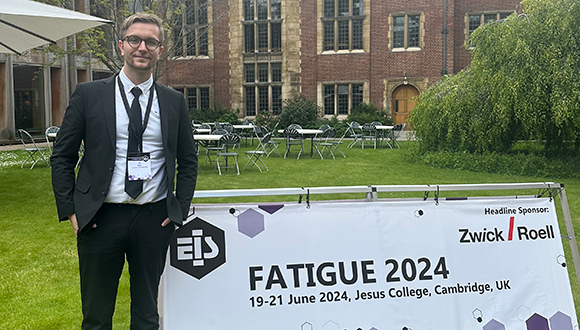Wed, 03 July, 2024
Cutting-Edge NSIRC Research at Fatigue 2024 Conference Unveils Innovations for Enhanced Industrial Performance and Safety
The recent Fatigue 2024 Conference held at Jesus College at the University of Cambridge, provided a platform for NSIRC (National Structural Integrity Research Centre) alumni Ali Alperen Bakır, Mehran Shahriarifar, and Shahryar Manzoor to present their groundbreaking PhD research.
The event showcased innovative studies and advancements in the field of structural integrity, bringing together researchers, scholars and industry professionals.
Ali Alperen Bakır captivated delegates with his presentation titled "Structural Integrity of Cold Spray Repaired Aluminium 7075 Alloys." His research delved into the mechanical performance of repaired materials under static and cyclic loading.
The focus on Aluminium Alloy (AA) 7075, widely utilised in the aerospace industry for its high strength-to-weight ratio and durability, underscored the significance of repairing components prone to damages such as corrosion pits and fatigue cracks.
Bakır's exploration of cold spray (CS) as a solid-state deposition method offered a promising alternative for repairing these components without the drawbacks associated with high-temperature processes.
 NSIRC Alumnus and TWI Project Leader Ali Alperen Bakır presented at Fatigue 2024. Photo: Ali Bakır
NSIRC Alumnus and TWI Project Leader Ali Alperen Bakır presented at Fatigue 2024. Photo: Ali Bakır
Dr. Mehran Shahriarifar's presentation, "Investigation on the Fatigue Behaviour of Stainless Steel 316L Produced by Laser Powder Bed Fusion Process," added to the depth of knowledge by examining the fatigue behaviour of 3D-printed materials.
His research shed light on the additive manufacturing (AM) process, specifically laser powder bed fusion (L-PBF), and its potential impact on industries such as aerospace, automotive, and oil and gas, etc.
With a focus on investigating the effect of build direction and heat treatment on microstructure, tensile, and fatigue properties of L-PBF AISI 316L, and the correlation between these properties, Dr. Shahriarifar's work contributes significantly to understanding the performance of materials produced through this innovative manufacturing method.
Shahryar Manzoor, an NSIRC PhD student, showcased his research poster entitled "Mechanistic Understanding Of Ageing Offshore Structures" at the conference.
His work addressed the pressing issue of ageing offshore structures, particularly those installed in the 1980s, which are reaching or surpassing their anticipated "design life."
With a critical examination of modern fatigue design codes and their conservatism, Manzoor aims to establish strategies to challenge and potentially remove this conservatism, thereby contributing to the longevity and safety of offshore structures.
The presentations and research shared by these bright minds at Fatigue 2024 exemplify the depth of knowledge and innovation within the field of structural integrity.
As the industry continues to evolve, these findings offer promising insights into enhancing the performance, safety, and longevity of critical components and structures.
The contributions of NSIRC students to this conference reflect the immense potential for further advancements and breakthroughs in the realm of structural integrity and materials science.